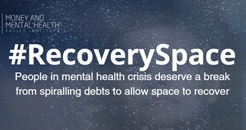 Recovery space
Recovery space
From a report by the Money and Mental Health Policy Institute
Minimising financial harm caused by mental health crisis
A mental health crisis could affect any one of us, at any time. But life doesn’t stop during these periods of intense distress or altered reality. Bills and rent must still be paid; charges and fees stack up when payments are missed. People often continue to have access to credit, and may need to make serious decisions around savings and pensions.
Crisis and home recovery teams are the first point of medical support for most people experiencing a mental health crisis. In 2017, it is estimated that 500,000 referrals to crisis care teams were made in England alone. From these referrals, tens of thousands of people received care in the community, while nearly 100,000 adults were admitted to hospital. A quarter of people experiencing a mental health problem are also in problem debt, suggesting that 23,000 people were in serious financial difficulties while in hospital for their mental health last year. However, the Money and Mental Health Policy Institute believes that the number of people affected is significantly higher as people run down savings, go without meals, etc.
In a mental health crisis a person may experience acute distress or altered reality, their cognitive capacity may fluctuate, and their psychological or emotional state may reduce their ability to cope with everyday tasks and make it impossible to stay on top of their finances.
The authors make policy recommendations to ensure that people receiving medical support for a mental health crisis are protected from financial harm, and given space to recover. Recommendations are made on extending the Government's Breathing Space scheme to all those in hospital with mental health issues, allowing carers access to tools to reduce financial expenditure by the client, stopping any issue with payment of benefits e.g. sanctions, compassion from essential service organisations, etc.
Read the full report here
You can also support their campaign here.
If you work for a financial services firm or an essential services organisation, please review this report and discuss how you need to adapt your policies and practices for this group of very vulnerable people.
Retweet about this article:
From a report by the Money and Mental Health Polic, 21/03/2018